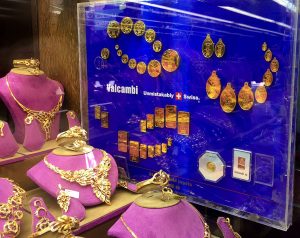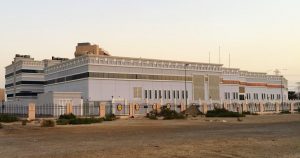25 Jul BENEATH THE SHINE: A TALE OF TWO GOLD REFINERSGLOBAL WITNES
How the world’s biggest gold refiner is sourcing from a company that has bought gold linked to militias in Sudan
The world’s largest gold refiner, Switzerland-based Valcambi, has sourced over 20 tonnes of gold from UAE-based refiner and gold trader Kaloti, which likely purchased Sudanese conflict gold in 2012 and was at high risk of doing so in subsequent years, our new investigation reveals.

Valcambi bars sold in Dubai. Global Witness
In 2012 Kaloti likely sourced at least 20 tonnes of gold linked to armed groups in Darfur, Sudan, scene of a long-running conflict and alleged genocide, and it continued to buy gold potentially linked to conflict from the Central Bank of Sudan between 2013 and 2019. Despite this, Valcambi appears to have ignored obvious signs that Kaloti’s gold might be linked to conflict.
KEY FINDINGS
We reveal that Kaloti sourced over 57 tonnes of Sudanese gold in 2012 alone. The UN has estimated that at least 30 of the 65 tonnes of gold that Sudan exported to the UAE that year were connected to militias in Darfur, where a gold rush had just begun.
Since then, Kaloti has continued to acquire gold from the Central Bank of Sudan. At various points between 2012 and 2019, the Central Bank bought gold connected to armed groups involved in fighting for control of the Darfur mines. This included purchasing gold from a company linked to the Rapid Support Forces (RSF). The RSF is currently Sudan’s most powerful paramilitary group and was reportedly involved in massacring over 100 pro-democracy demonstrators in Khartoum in 2019. That year the Central Bank appears to have bought gold from mines occupied by another armed group, the Sudan Liberation Army/Abdul Wahid, which has engaged in killings, kidnapping, torture, extortion and forced labour.
In spite of Kaloti sourcing from the Central Bank of Sudan, a high-risk supplier linked to conflict, Valcambi acquired around 20 tonnes of gold directly from Kaloti in 2018 and 2019. During that same period, Valcambi also sourced over 60 tonnes of gold from Trust One Financial Services Ltd, a UK-registered company whose directors include Kaloti Group founder Munir Kaloti’s son.
While Valcambi presents itself as an industry pioneer in responsible sourcing and claims to go above and beyond the internationally recognised OECD due diligence standards, it is contravening those very standards by failing to scrutinise Kaloti’s irresponsible sourcing practices and continuing to source gold from the problematic refiner.

Kaloti’s new refinery in the heart of the Dubai Multi Commodities Centre free trade zone. Global Witness
Our findings severely undermine the credibility of the London Bullion Market Association (LBMA), the gold sector’s premier accreditation body, which has continued to include Valcambi on its Good Delivery List. Any company on this list is supposedly required to carry out robust supply chain due diligence, which Valcambi has seemingly failed to do of Kaloti. The gaps in the LBMA’s responsible sourcing standards and the body’s apparent lack of oversight of Valcambi has facilitated the company’s due diligence failures vis-à-vis Kaloti. Valcambi’s auditor KPMG also appears to have turned a blind eye to Valcambi’s sourcing from a high-risk supplier.
These failures in Valcambi’s audit process recalls the scandal exposed by the 2014 Global Witness report City of Gold, in which auditor Ernst & Young (EY) and the Dubai Multi Commodities Centre (DMCC) – against whose ‘Dubai Good Delivery Standard Kaloti’ was audited – colluded with Kaloti to hide its involvement in gold smuggling. Our new report reveals that EY’s successor Grant Thornton also helped Kaloti to downplay due diligence failures.
The governments in jurisdictions where these refiners are based are also part of the problem, as they solely seem to rely on the sector’s inadequate attempts at self-policing instead of taking responsibility for stopping the gold trade from fuelling and funding conflict and human rights abuses. The UAE, a notorious hub for high-risk gold, does little to enforce due diligence requirements and Switzerland lacks any meaningful legislation of responsible sourcing. These regulatory weaknesses mean that conflict gold could still be finding its way into reputable markets.
Both Kaloti and Valcambi have denied Global Witness’ findings and claimed they conduct enhanced due diligence when sourcing from conflict-affected and high-risk areas.
RECOMMENDATIONS
To address the systemic problems in the gold industry and break its ties with conflict and human rights abuses, Global Witness is calling on:
- the UAE and Swiss authorities to adopt and enforce stringent legislation on supply chain due diligence.
- accreditation bodies such as the DMCC and LBMA to ensure that refiners properly adhere to their due diligence standards, that audits are carried out in a meaningful way and that adequate sanctions are imposed on refiners that breach their standards.
- Valcambi and other refiners to ensure, in line with the OECD Guidance, that they have effective due diligence systems and that they do not source conflict gold nor source from companies that could be accepting conflict gold.

